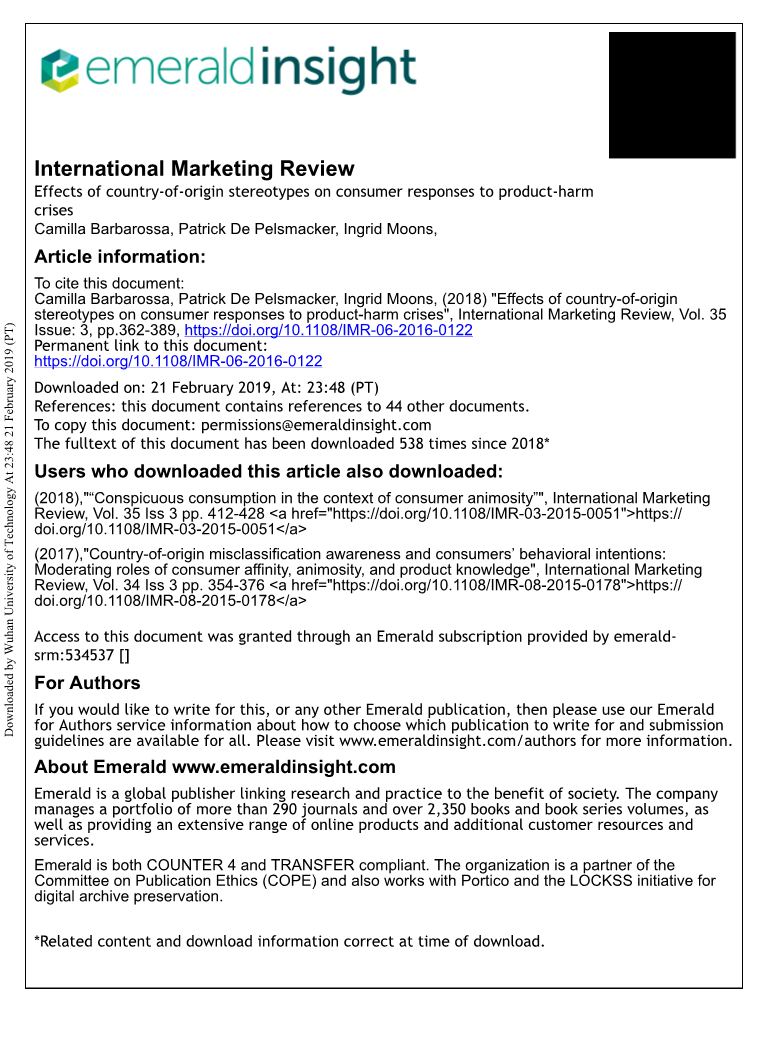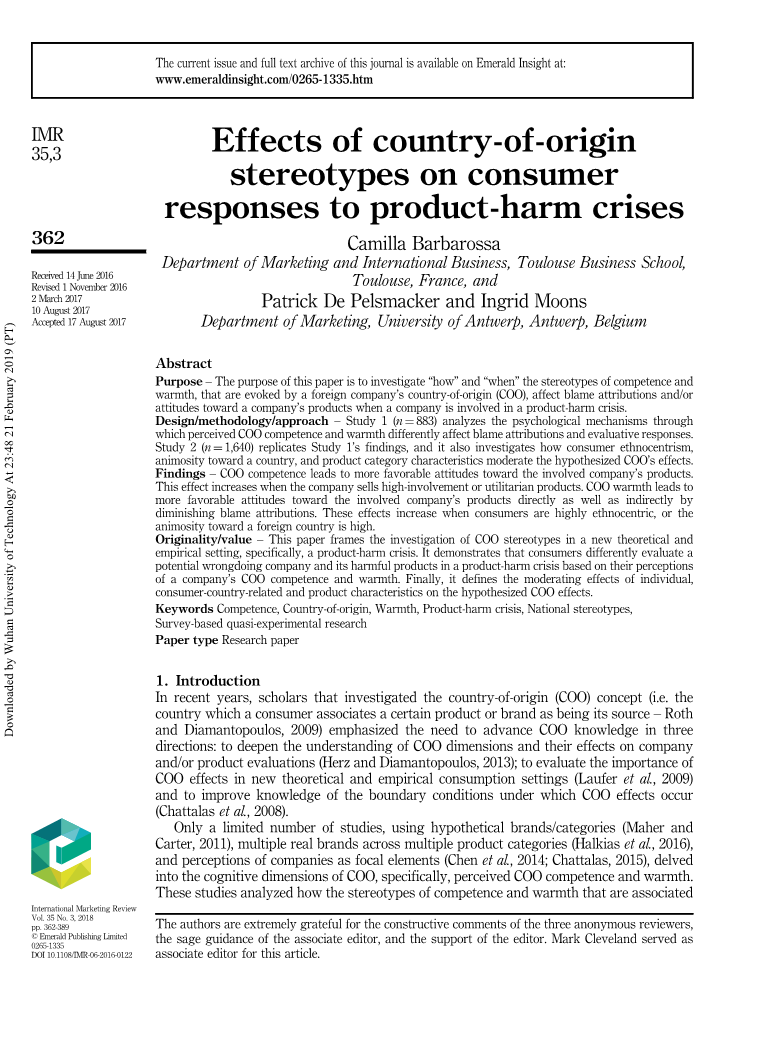

英语原文共 29 页,剩余内容已隐藏,支付完成后下载完整资料
Effects of country-of-origin stereotypes on consumer responses to product-harm crises
原产地刻板印象对消费者
如何应对产品有害危机的影响
Abstract摘要
Purpose – The purpose of this paper is to investigate “how” and “when” the stereotypes of competence and warmth, that are evoked by a foreign companyrsquo;s country-of-origin (COO), affect blame attributions and/or attitudes toward a companyrsquo;s products when a company is involved in a product-harm crisis.
目的:本文旨在探讨当一家公司陷入产品有害危机时,因原产国的刻板印象引起的关于能力和热情的刻版印象,是何时并且是如何影响责任归咎或是消费者对公司产品的态度。
Design/methodology/approach – Study 1 (nfrac14;883) analyzes the psychological mechanisms through which perceived COO competence and warmth differently affect blame attributions and evaluative responses. Study 2 (nfrac14;1,640) replicates Study 1rsquo;s findings, and it also investigates how consumer ethnocentrism, animosity toward a country, and product category characteristics moderate the hypothesized COOrsquo;s effects.
研究设计/方法论/方法:研究1(nfrac14;883)分析了对原产国的能力和热情的认知会对责任归咎和评估反应产生不同影响的心理机制研究2(nfrac14;1640)延续了研究1的发现,它还检验了了消费者种族中心主义、对一个国家的敌意以及产品类别特征如何减缓假设原产地效应的假设。
Findings – COO competence leads to more favorable attitudes toward the involved companyrsquo;s products. This effect increases when the company sells high-involvement or utilitarian products. COO warmth leads to more favorable attitudes toward the involved companyrsquo;s products directly as well as indirectly by diminishing blame attributions. These effects increase when consumers are highly ethnocentric, or the animosity toward a foreign country is high.
结论:原产国的能力(强)会导致消费者对公司产品持更加认可的态度。当公司销售高参与度或实用性产品时,这种影响会增加。原产国的热情(高)会直接导致消费者对公司产品持更加认可的态度同时还会间接地减少责任归咎,从而对相关公司的产品产生更有的态度。当消费者具有高度的种族中心主义,或者对外国的仇恨很高时,这些影响就会增加。
Originality/value – This paper frames the investigation of COO stereotypes in a new theoretical and empirical setting, specifically, a product-harm crisis. It demonstrates that consumers differently evaluate a potential wrongdoing company and its harmful products in a product-harm crisis based on their perceptions of a companyrsquo;s COO competence and warmth. Finally, it defines the moderating effects of individual, consumer-country-related and product characteristics on the hypothesized COO effects.
创新性/研究价值:本文在一个新的理论和经验背景下,特别是产品危害危机中,对原产国刻板印象进行了研究。它表明,消费者会根据对原产国刻板印象的感知,来对产品有害危机中潜在的不法公司及其有害产品进行不同的评估。最后,定义了个体、消费者与地域的相关性和产品特征对原产国效应的调节作用。
Keywords Competence, Country-of-origin, Warmth, Product-harm crisis, National stereotypes, Survey-based quasi-experimental research
关键词:能力、原产地、热情、产品有害危机、民族中心主义、基于调查的实验
Paper type Research paper
论文类型:研究型论文
- Introduction 介绍
In recent years, scholars that investigated the country-of-origin (COO) concept (i.e. the country which a consumer associates a certain product or brand as being its source – Roth and Diamantopoulos, 2009) emphasized the need to advance COO knowledge in three directions: to deepen the understanding of COO dimensions and their effects on company and/or product evaluations (Herz and Diamantopoulos, 2013); to evaluate the importance of COO effects in new theoretical and empirical consumption settings (Laufer et al., 2009) and to improve knowledge of the boundary conditions under which COO effects occur (Chattalas et al., 2008).
近年来,研究原产国(COO)概念(即消费者将某一产品或品牌作为其来源的国家——Roth和Diamantopoulos,2009年)的学者强调,有必要从三个方向提高对原产国的认知:加深对原产国维度及其对公司和产品评估的影响的理解。(Herz和Diamantopoulos,2013年);评估新理论和经验消费环境中原产地效应的重要性(Laufer等人,2009年),并提高对原产地效应发生的限制条件的认识(Chattalas等人,2008年)。
Only a limited number of studies, using hypothetical brands/categories (Maher and Carter, 2011), multiple real brands across multiple product categories (Halkias et al., 2016), and perceptions of companies as focal elements (Chen et al., 2014; Chattalas, 2015), delved into the cognitive dimensions of COO, specifically, perceived COO competence and warmth. These studies analyzed how the stereotypes of competence and warmth that are associated with a foreign companyrsquo;s origin affect company and/or product evaluations, and they further developed conceptual frameworks to envisage possible boundary conditions for such effects (Chattalas et al., 2008).
只有有限数量的研究,使用假设的品牌/类别(Maher和Carter,2011年)、跨多个产品类别的多个真实品牌(Halkias等人,2016年)和公司概念作为焦点要素(Chen等人,2014年;Chattalas,2015年)来深入探讨原产国的认知维度,特别是对原产国能力和热情的认知。这些研究分析了与外国公司发源地相关的能力和热情的刻板印象是如何影响(消费者对)公司或产品的评估,并进一步开发了概念框架,以设想此类影响的可能限制条件(Chattalas等人,2008年)。
These studies framed COO stereotypes in customary consumption settings. None of them assessedtheeffectsofCOOstereotypesinextraordinary, critical,consumption contexts,such as corporate misconduct and, in particular, product-harm crises, which can be defined as “discrete, well-publicized occurrences wherein products are found to be defective or dangerous” (DawarandPillutla,2000,p.215).Product-harmcrises(andconsumerevaluations inthese contexts)differfrom customary consumption environments. Product-harmcrises are relatively unusual events in a companyrsquo;s life, and they have potentially dramatic effects on consumer health and company performance (Klein and Dawar, 2004). Additionally, in these critical contexts, consumer evaluations are: directed to potential wrongdoers and/or their harmful products (Laufer et al., 2009); formed through specific psychological mechanisms of blame attributions (Folkes, 1984; Weiner, 1986); and further influenced by consumersrsquo; pre-existing beliefs about the involved company, such as beliefs of competence and warmth that are associated with a potential wrongdoerrsquo;s COO (Xu et al., 2013).
这些研究在传统的消费环境中构建了原产国刻板印象。他们都没有评估原产国刻板印象在特别的、关键的消费环境中的影响,例如企业不当行为,特别是产品有害危机,也就是“发现产品存在缺陷或危险的、分散且广为人知的事件”(Dawarandpillutla,2000,p.215)。产品危害危机(AndCo)与传统的消费环境不同。产品有害危机是公司发展历程中相对不寻常的事件,它们可能对消费者健康和公司绩效产生巨大影响(Klein和Dawar,2004年)。此外,在这些关键背景下,消费者们的评估是:直指潜在犯罪者及其有害产品(Laufer等人,2009年);这种评估形成于特定的归因心理机制(Folkes,1984年;Weiner,1986年);并进一步受到消费者对所涉公司的现有信念的影响,例如与潜在犯罪者的能力和热情相关的
全文共77836字,剩余内容已隐藏,支付完成后下载完整资料
资料编号:[2696]


